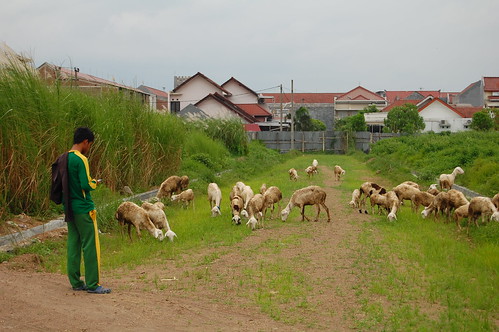The original idea of a MOOC back in 2008 was that anyone can start a course and create a learning community around a subject of common interest. Open tools and platforms should be used so that there are no technical barriers to participation. Basically if you and some colleagues would like to investigate a particular subject or test some ideas you can invite the world to join in. There are still plenty of truly open grassroots MOOCs, more or less massive, but the vast majority today are highly polished professional productions from major universities and often extremely expensive to produce. As a result many smaller institutions, especially in developing countries, are discouraged from even considering open education. If the role model is a slick multimedia course from a high status university with over 100,000 participants it's easy to fell overwhelmed.
But a MOOC doesn't have to be so massive and the production costs can be kept low without compromising pedagogical quality. The promise of MOOCs was to widen participation and access to higher education especially for those who cannot afford a regular campus course. The problem with the high profile MOOCs is that all the video content, animations and other bandwidth heavy content puts them out of the reach of millions in developing countries.
Commonwealth of Learning (CoL) has now launched a free and open MOOC platform to enable smaller organisations in developing countries to run MOOCs without needing to invest so much money. The concept is called MOOC4D (MOOCs for development) and is built on the platform mooKIT offering a low bandwidth solution that is free to use for courses of up to 10,000 participants. The concept is that running a MOOC should be as easy as taking one. The platform offers participants the chance to download text and audio content for offline use and none of the content should use much bandwidth. At present there is only a limited range of courses available (Mobiles for development, ICT Basics, Climate change in the Pacific, Teacher training in the Seychelles and a MOOC on MOOCs) but the potential for this kind of platform is immense. The first course, appropriately a MOOC on MOOCs, has now been evaluated and a report is now available with analysis and conclusions, Massive Open Online Course (MOOC) on MOOCs: Course Evaluation. Here's an introduction video to the mooKIT platform.
Another fine example of low-tech online learning is a MOOC on horticulture taught in Hindi and run by the Indian Institute of Technology in Kanpur with support from CoL. This MOOC uses only mobile phones for distribution with regular short audio lessons being stored on voice mail and always accessible. Tests in the form of quizzes are also carried out by phone. The prototype course with over 1000 participants has been evaluated and a report has been published about the results with recommendations for future development, MobiMOOC - a massive open online course on horticulture - an effectiveness study, Uttar Pradesh State, INDIA.
The exciting thing with this type of initiative is providing a simple, open platform that enables institutions in developing countries to offer open courses that are adapted to the technical limitations of the areas they serve. It can also mean that more MOOCs are produced in smaller languages and thus offer a tool to empower local language and culture. Surely the real benefit of the MOOC movement is enabling everyone to participate in online learning.

No comments:
Post a Comment
Note: Only a member of this blog may post a comment.